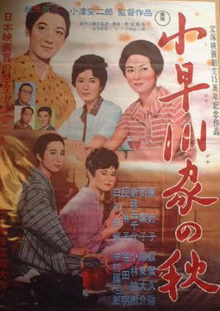Here is another film by Yasujirō Ozu, though of course a much less well known one than Tokyo Story. I originally thought that this was part of the director’s so-called Noriko Trilogy but it turns out that this doesn’t count because although actress Setsuko Hara appears in it, her character here is named Akiko. It’s extra confusing how all the same cast members appear but playing different roles. The themes here are less sharply defined as well but it still makes for an excellent family drama.
Akiko, the widowed daughter-in-law of the elderly Manbei Kohayagawa and Noriko, his youngest daughter, both face attempts by the Kohayagawa family to matchmake them with suitable husbands. The family owns a sake brewery that is not doing well and they hope that these prospective husbands might help their finances. Both however are reluctant. Akiko is seemingly happy to raise her son on her own, while Noriko is keen on another man nearer her own age but who lives far away. Meanwhile the old man Manbei whose own wife died some time ago recently ran into an old girlfriend of his and has been trying to rekindle the relationship, exasperating his children who wants him to act his age. The woman has a daughter of her own who she claims is Manbei’s but there is reason to doubt that as they seem to be trying to get some of his money.
This is a lesser Ozu film with no truly standout scenes and vaguer themes that feel recycled from older films. It also seems packed with unneeded characters. The reason for this is that Ozu usually works under the Shochiku label and this was his only film under the bigger Toho studio and so many actors under the studio wanted a role in an Ozu film even if it meant a small part. Still it’s an excellent drama and I especially appreciate how it takes place during a hot summer and so everyone is constantly complaining about and reacting to the heat. It’s also fascinating how it shows the daughter of the mistress to be a much more Westernized character and even has an American boyfriend but there is also an accusatory element there of their being a family with loose morals.
Thematically, that it acts as a meditation on death seems trite and unremarkable. A more interesting take is that it highlights the lack of female agency at the time. The men of the Kohayagawa family seem to consider it self-evident what is best for Akiko and Noriko, and of course marrying appropriately prosperous husbands just happens to save the family business as well. But both women have plans of their own and only really share them between the two of them. Meanwhile the patriach of the family Manbei does as he pleases with his old mistress and is not shamed at all though his eldest daughter sarcastically tries her best. It is a little odd how the matchmaking for both women go through the same man, seemingly another relative, though we don’t know what his day job is. The film even makes him seem like something of a pimp as he tries to aggressively promote Akiko to a rich businessman and goes around with a folio tucked under his arm.
All in all, this is a pleasant enough watch eve if it is not truly great. The most amusing parts are probably the antics of Manbei as he first tries to evade the employee of the family business sent to tail him and then plays games at home with a grandchild to avoid his eldest daughter’s suspicions. He is the closest thing the film has to an antagonist but Ozu’s films are seemingly never accusatory and so he is mostly seen as a lovable rogue.
